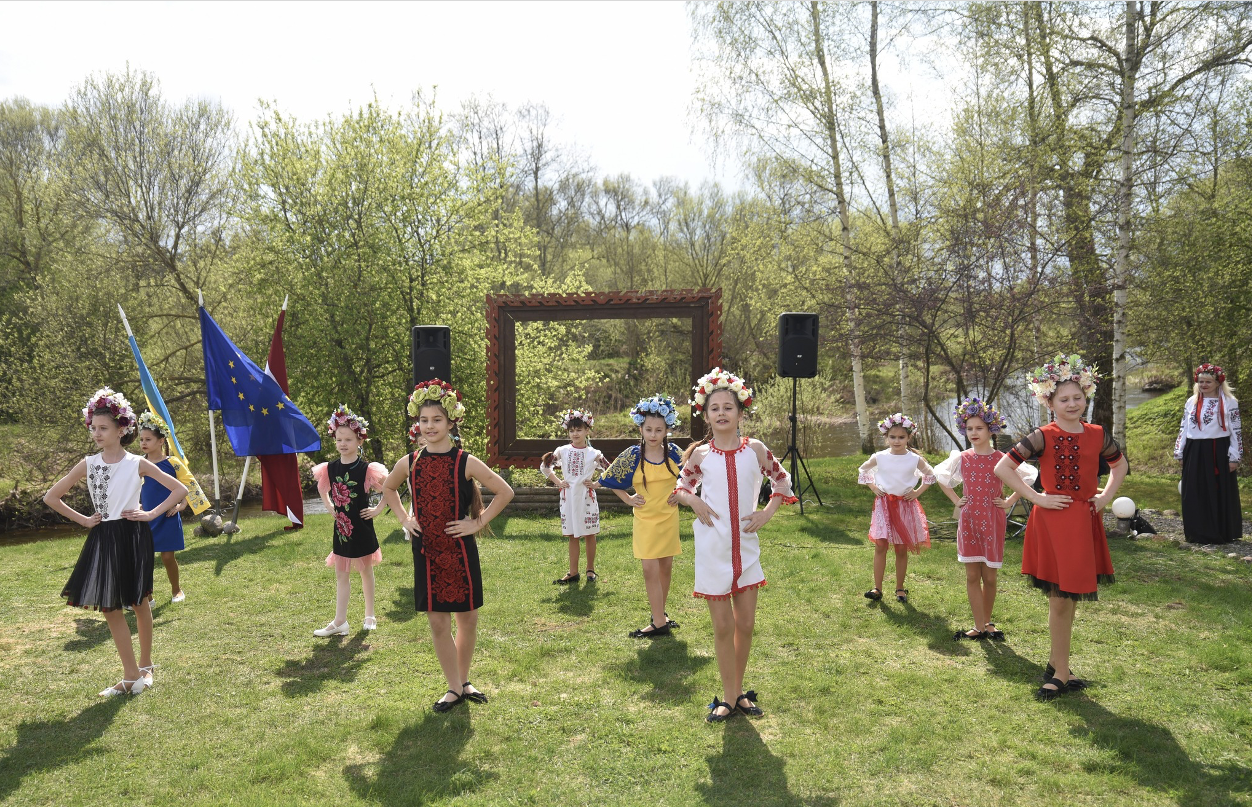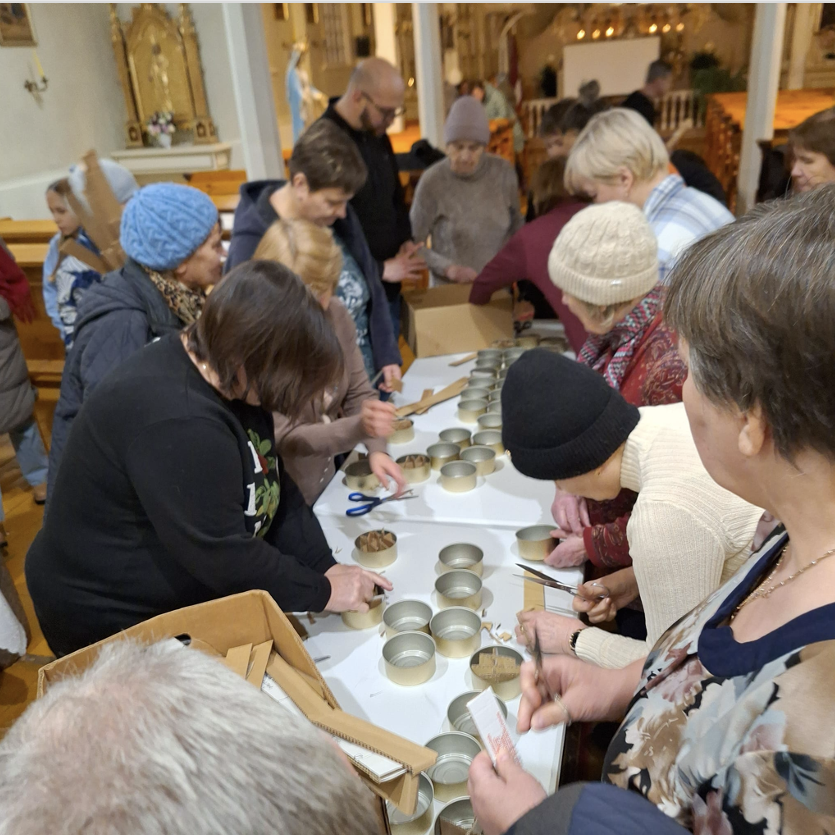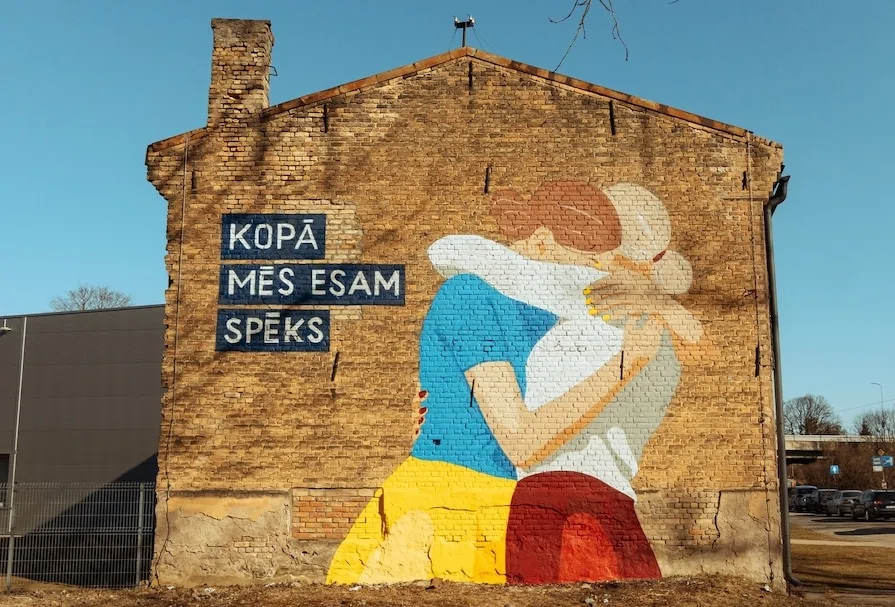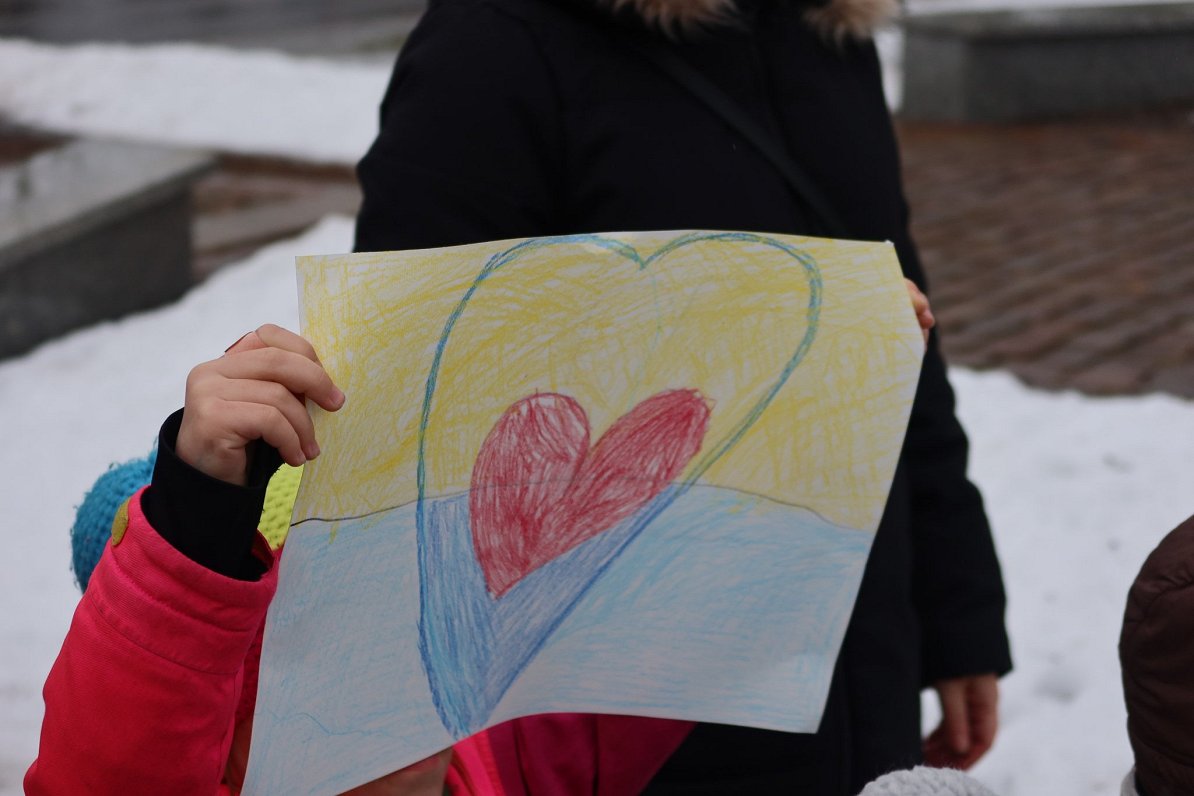“There is only one reason why we left. The war started,” Stavskiy said. They regretted having to leave their home but were grateful to have a safe place to go.
As of January 2025, over 6.8 million people have left Ukraine as a result of the war with Russia, according to the UN Refugee Agency, including Stavska, 60, and Stavskiy, 66. In the first two weeks of the war, Russia launched over 40 rocket and air attacks on Zhytomyr, through which humanitarian aid from Europe was being provided to Kyiv and eastern regions of the country.

Lyceum No. 25, where Stavskiy taught music, was destroyed in a March 2022 Russian attack (Valeriy Stavskiy).
In Zhytomyr, Stavska owned an advertising business that operated across Ukraine and Stavskiy was a music teacher at Lyceum No. 25. Neither would be able to continue their former jobs if they returned to Ukraine. The school where Stavskiy worked was destroyed.
Stavska and Stavskiy made a new home in Rēzekne, where Stavska was born and grew up and where she now teaches Latvian and Russian to school children. When they first arrived, they lived in a guest house with many Ukrainian families. The guest house was close to a road and trucks passing by sounded like airplanes, which the refugees associated with bombing. This caused panic.
“For a month, I was running out at night from my room to help people calm down and say that everything’s fine,” Stavskiy said.
The couple quickly became active members of the community, working to help Ukrainian people adjust to their new life in Latvia and ensure the community of Ukrainians in Latvia is strong.
“We came here with what we had. We didn’t have anything warm to wear. Thanks to Daiga’s friends, classmates, and people we did not even know that communicated with each other and Daiga, all the people [Ukrainians who fled to Rēzekne at the time] in a week had warm clothes. They had different toys for children. They even had bicycles and different things. They were ready to go to school. They had everything,” Stavskiy said.

Daiga Stavska, Valeriy Stavskiy and members of the Ukrainian community in Rēzekne gather in front of the “United for Latvia” monument for the Day of the Flag of Ukraine celebration, Aug. 2022 (Valeriy Stavskiy).
Last year, Stavska and Stavskiy started an organization called Latgales Ukraiņu Biedrība “Druzi,” meaning Ukrainian Association of Latgale “Friends.” Latgale is the easternmost region of Latvia where Rēzekne is located. Although they started the organization in 2024, their community involvement began almost immediately upon arrival in Latvia.
The couple helped connect Ukrainian families with one another and their work has motivated more Ukrainians to settle in Rēzekne. Many members of their community recommend the area to friends and family fleeing the war. Latvia is like a sister country to Ukraine, Stavska and Stavskiy said.
“We have this community we can work with, not only the two of us, but many people,” Stavskiy said.
The couple organizes regular meetings and projects for Ukrainians living in Rēzekne. The community hosted a friendship day for Ukrainians and Latvians to come together and a celebration for Vyshyvanka Day, a day to honor Ukrainian folk traditions such as wearing traditional Ukrainian shirts, vyshyvankas.

Children perform at a friendship day between Ukrainians and Latvians in Rēzekne, June 2023 (Valeriy Stavskiy).
Stavskiy estimated about 300 Ukrainian people live in Rēzekne and 150 Ukrainian people participate in community events.
However, the Ukrainians living in Rēzekne often communicate in Russian in their daily lives because it is a common language between many Ukranians and Latvians, Stavskiy said. In addition to teaching schoolchildren, Stavska also teaches Latvian language to Ukrainian adults who want to learn the language of their new country. But, Stavska and Stavskiy do not want Ukrainian people to forget their native tongue.
“We want Ukrainian national identity and language to still be with us,” Stavskiy said.
The Ukrainian Association of Latgale organizes events in Ukrainian language for children. “It’s important to speak with them in Ukrainian and to connect with each other and to be together and do different activities using Ukrainian language,” Stavskiy said.
As an organization, the Ukrainian Association of Latgale does not have much money, but has a lot of enthusiasm.
“If we can help here, not only Ukrainians, but also Latvians, with their activities and with their work, we will stay here and be helpful here. We want to be helpful wherever we are,” Stavskiy said.
Stavskiy has taught people how to be active for 40 years and held camps for children, teaching skills from archery to hiking. He has continued to do so in Latvia, hosting camps with different activities such as ballet, camping and survival skill sessions. Although people have always expressed interest in Stavskiy’s camps, the war has increased demand for survival and strength skills for both the community and Stavskiy.
When Russia invaded Crimea in 2014, he created a “gym in the pocket,” two wooden slats connected by a rope that you can exercise with. He almost always carries it with him.
“When the war started, people needed it [defense skills]. It was more like a necessity,” Stavskiy said.
Stavska and Stavskiy miss their life in Ukraine and fear for the safety of their family. Their grandchildren still live in Ukraine and their sons, aged 39 and 44, serve in the Ukrainian military.
Stavskiy texts his son the same message every day: “God help you. I’m praying for you.” His son replies: “Have a good day.” This message tells Stavskiy that his son is alive, wherever he may be. Stavskiy and Stavska’s sons are fighting for Ukraine in the war with Russia.
Both of their sons have been recognized by Ukrainian President Volodymyr Zelenskyy with medals for their bravery and service to Ukraine. Stavskiy tried to join the army himself six times, but was denied each time because of his age.

People in the Ukrainian community in Rēzekne gather to make candles for the Ukrainian army once every month (Valeriy Stavskiy).
The Ukrainian Association of Latgale and the Ukrainian community at large in Rēzekne have supported their troops by sending necessities such as nets, candles, socks, batteries, food, tea, clothes and cars to the soldiers in Ukraine.
Zelenskyy praised the commitment of the Ukrainian diaspora, Ukrainians living outside of the country, to their homeland. “It is important for people in Ukraine to know that they are not alone, that their interests are represented in every country, in every corner of the world,” Zelensky said in a social media post after meeting with the Ukrainian community in Washington, D.C in February.
There have been multiple waves of refugees that have left Ukraine over time and the Ukrainian diaspora has spread around the world to over 20 million people, according to the Ukrainian World Congress. Both those who left years ago, and those who left because of the current Russian invasion, can contribute to Ukrainian strength.
“The Ukrainian diaspora matters. They organize. They do a lot of public facing activities and offer assistance to friends and family back home, to the troops at home,” Professor Victoria Harms, Associate Teaching Professor of history at Johns Hopkins University said. “You see them in solidarity, maintaining ties, celebrating the same culture, celebrating the holidays together. In that sense, you can call it an act of resistance.”
In many ways, Stavska and Stavskiy’s lives in Latvia have continued to revolve around the Ukrainian community and how they can serve their people.

Mural in Riga, Lativa of Ukrainian and Latvian girls, wearing their respective nations’ colors, hugging one another, which reads, “Together We Are Strong” (Rīgas investīciju un tūrisma aģentūra).
Stavska and Stavskiy expressed gratitude to Latvia for all of their help. In the first half of 2025, Ukraine will receive 12,000 Latvia-made Unmanned Aerial Vehicles (UAVs). Latvia has donated $920 million to help Ukraine through military aid, supporting Ukrainian refugees in Latvia, and donating humanitarian and reconstruction aid, according to the Ministry of Defence of Latvia.
“We’re very, very thankful to Latvia and the Latvian people,” Stavskiy said.
